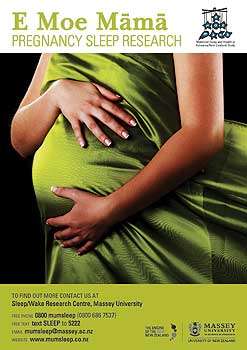Pregnant women's changing sleep patterns revealed

Nearly a third of pregnant Māori and non-Māori women report sleeping less than six hours in late stages of pregnancy, a study by Massey University sleep scientists has concluded.
It also shows one in five New Zealand pregnant women report loud snoring in late pregnancy – a finding that backs up overseas research that shows this can increase symptoms of depression in pregnant women, the chances of requiring a caesarean to give birth and having a small for age baby.
Dr Leigh Signal and Dr Sarah-Jane Paine, from the Sleep/Wake Research Centre at Massey's Wellington campus, lead the study, E Moe Māmā, Maternal Sleep and Health in Aotearoa/ New Zealand. It is one of New Zealand's most comprehensive research projects investigating sleep changes in Maori and non-Maori women in late pregnancy and post birth.
More than one thousand women, aged 16 to 46, were involved in the study, which also explored the relationship of pregnant women's maternal health, wellbeing and mood. While some of this data has already been published by researchers at Massey's College of Health, Dr Signal says a preliminary analysis determined that sleep duration and quality and symptoms of sleep disorders (for example snoring) might also be associated with depressive symptoms in New Zealand women.
"Our unpublished New Zealand data supports the small body of international research and suggests sleep may have a role in increasing the risk of developing depressive symptoms which could herald the development of a more significant mood or anxiety disorder. It may also be important in determining the need for medical intervention at birth."
Disrupted sleep patterns warranted attention Dr Signal says as short sleep periods was associated with poor health prognosis for pregnant women resulting in a higher likelihood of requiring a caesarean, longer labour and increased probability of gestational diabetes.
There was evidence of ethnic differences in some, but not all, aspects of sleep in late pregnancy too. Māori were more likely to report symptoms of sleep disorders including breathing pauses during sleep, period limb movements and daytime sleepiness. Māori were also more likely to report "long sleep" (or sleeping longer than nine hours in a 24-hour period) than non-Māori.
Other analysis determined if the amount or quality of sleep affected whether a baby was delivered via caesarean or naturally.
"Our early results indicate that frequent breathing pauses during sleep (a symptom of sleep disordered breathing) may have a role in increasing the risk of a woman requiring a caesarean section," Dr Signal says.
A total of 407 Māori women and 737 non-Māori women completed the study that involved filling out a questionnaire between 35-37 weeks of pregnancy, answering questions over the phone one month to six weeks after birth and filling out a further questionnaire at 12 weeks.
Other aspects of the research investigated sleep duration, factors that disturb sleep in late pregnancy and when new mothers expected to return to work.
Dr Signal and Dr Paine stressed that one of the overwhelming conclusions from the study was just how important sleep was for a pregnant women's health and also for the health of their growing baby.
"If you feel sleepy during the day and are able to nap then do so. Don't do this if it makes it harder for you to fall asleep at night. But make getting enough sleep one of your top priorities."














